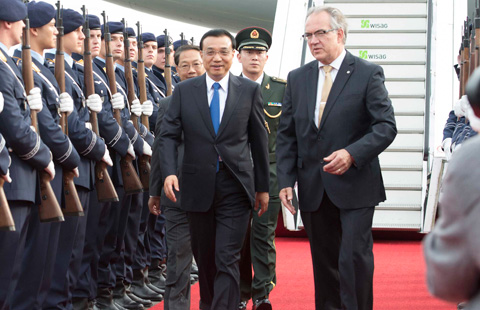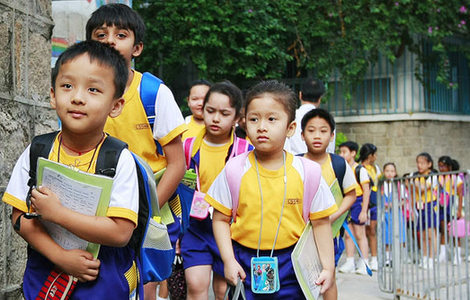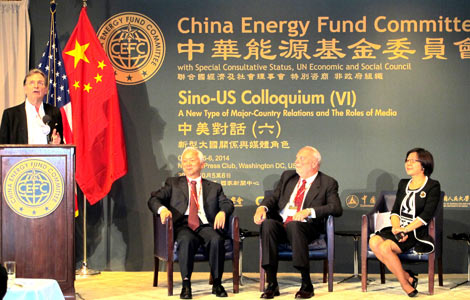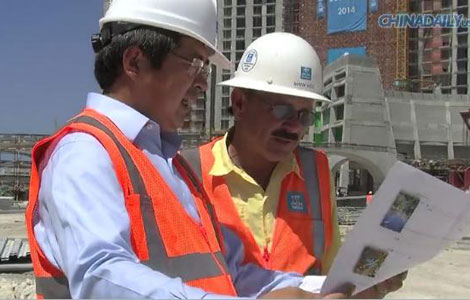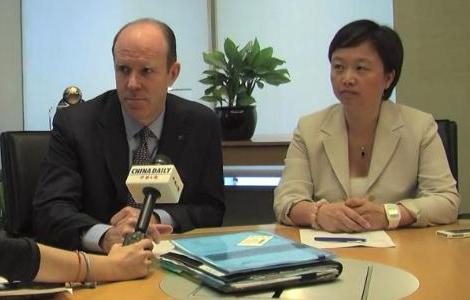Robert Hormats: 94 visits to China give him special insight
Updated: 2014-07-18 09:15
By ZHANG YUWEI in New York(China Daily USA)
|
||||||||
|
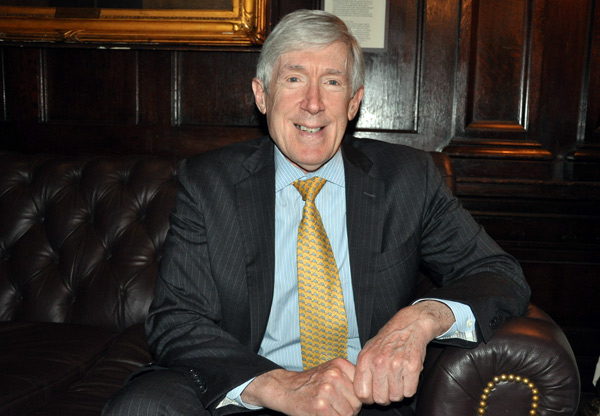 Robert Hormats, under secretary of state for economic growth, energy, and the environment from 2009 to 2013, visited China 94 times. ZHANG YUWEI / CHINA DAILY
|
On an autumn day in 1980 at a noodle stand in Xi'an, a city in northwestern China, when Robert Hormats was asked by a local official to try some street food, a few young Chinese children came to greet him in English.
"Are you American?," Hormats recalled one of them saying. "We are learning English and want to study in America."
Hormats was then the US deputy trade representative and was among US officials who visited China shortly after the two countries established diplomatic ties in 1979.
"I have always felt that there is a real desire among average Chinese for close relations with the United States — not that they agree with everything that the US does; many don't — but I think they admire the technological strength and the dynamic society," said Hormats, now vice-chairman at Kissinger Associates Inc.
As a staffer in Henry Kissinger's National Security Council between 1969 and 1977, Hormats said one of his most significant assignments was helping prepare for, and the follow-up to, US President Richard Nixon's historic China trip in 1972.
Throughout the past four decades, Hormats has continued working on advancing the US-China economic relationship in different roles with the State Department, including his latest post as under secretary of state.
By now he has visited China for 94 times.
Hormats' China visits — including his time spent in second and third-tier cities which he says has been important for him to understand the country better — have given him a unique perspective on US-China relations.
"For Americans going to China before Nixon went, it was like going to another planet," Hormats said. "It was considered so distant."
"When I got there, I talked to people, the human element takes over," he said.
"Americans have to understand that it (China) is a very big, diversified country and it is not easy to govern," he said. "If you only go to China today and you think ‘well all this was inevitable', but there was nothing inevitable about it, it was based on very strong leaders with a very strong vision and a lot of hard work by millions of Chinese."
Recalling another China trip in the early days when he visited the Yellow River, he said he was very touched by how emotional his Chinese hosts were when they saw the river, which is considered "the cradle of Chinese civilization".
"China has an enormous sense of pride in its history and in what it has accomplished," Hormats said.
It has been 35 years since China and the US established diplomatic ties, one of the most important relationships in the 21st century, and it is called by some experts a Group of 2 (G2) concept, a relationship where the US and China would work out solutions to global problems together. Hormats said despite the important roles the two economic super powers play, the G2 is something that neither wants to emphasize or promote.
"Because the global system involves a wide range of important players — for the US, it is Europe and Japan and emerging powers, virtually nothing can be done without a wide range of countries participating in the process and participating in the outcome," said Hormats.
"In virtually any outcome, the role of the US and China is vitally important, because not only are they the two biggest economies, but each comes at these issues from a different historical perspective and from a different institutional perspective," he said.
Hormats said US and China's cooperation in resolving issues or making progress on them will be a "very good example to other countries that these two countries can play a certain dual leadership role."
"They need to work with other traditional economies and rising economies; no countries would want the US and China to make deals and impose them on others," he said.
China's economic growth as a developing and emerging market in the past decade made it an important player in the global economy. While many observers focus on its increasingly interdependent economic relationship with the US, Hormats said there is huge potential for the two to focus on cooperating, including addressing environmental issues.
"The only real way for China to dramatically reduce Co2 emissions in the near term is through natural gas — substituting national gas through coal," Hormats said. "The US has a lot of experience — not just technical experience but regulatory experience — in addressing environmental issues," he said.
"So cooperation on shale production in China can be very helpful for China's energy security."
As under secretary of State for economic, energy and environmental affairs, Hormats participated in various US-China exchanges, including the annual Strategic and Economic Dialogue (S&ED).
Hormats said he is proud of the progress made in energy talks by the two economic superpowers at the S&ED.
"There wasn't really an energy dialogue before and now we have a very robust, positive energy dialogue and there are huge opportunities for win-win solutions there," said Hormats.
Hormats' frequent visits to China have made him a China hand who appreciates many events in the country, which he says has a rich history and hard working people. Among his 94 visits to China, he met former Chinese leader Deng Xiaoping four times.
"He (Deng) was interested in internal reforms but he was also interested in new ideas," Hormats recalled.
"For a guy in his 70s, he had a very fresh mind," said Hormats, referring to Deng's famous theory – "It doesn't matter whether a cat is white or black, as long as it catches mice."
Hormats has high regard for China's domestic reform process from the Deng period to now. All developments in China — all — had to be combined with domestic reforms, he said. "The opening up was complementary to domestic reforms; it's a feature of it," said Hormats.
Like many other China experts, Hormats followed closely the Third Plenum of 18th Communist Party of China Central Committee at which the new Chinese leadership introduced a broader economic and political blueprint.
The past Third Plenum from last November was seen by some China observers as an event where only broad, general ideas were outlined.
Hormats disagrees. The Third Plenum shows a vision by a strongly committed group of leaders, he said.
"I think the Third Plenum will go down as one of the historic moments in Chinese economic history and I think the leadership of President Xi is really very powerful," he said.
"What he (Xi) has done is to strengthen a lot of instruments of the Party to give leadership to many of these efforts so the Party is going to play a strong role."
A former vice-chairman with Goldman Sachs Group Inc between 1982 and 2009, Hormats, knowing little Chinese, was involved in securing two big China bond issues for Goldman. He sees China's economic reform effort as having good impact on the US and global economies.
"China's effort to grow in a more market-oriented and a less regulated way will be positive to the US," said Hormats. "China can be very bold in its economic reforms — not incremental — some can be incremental especially the economic zones, but some are very dramatic."
Hormats thinks the ongoing bilateral investment and the globalization of Chinese firms — with their innovations — will take the US-China economic relationship to a new level.
"There is certainly the issue of intellectual property but no one can say China is not innovative," said Hormats, citing areas such as healthcare.
"China needs to figure out ways in getting its brands globalized; I read it really as new basis of relations between China and the US," he said.
Most Viewed
Editor's Picks

|

|

|

|

|

|
Today's Top News
Premier pushes innovation on German visit
Beijing to keep the lid on air pollution for APEC
Li arrives in Germany, first leg of Europe trip
China's economy surpasses US
IMF: Shadow banking filling gaps
China's status prominent at 'Big Four' firm Ernst & Young
US Ebola patient dies
China's role grows in Gates Foundation tech push
US Weekly

|

|

